229 Search Results for partner strategies
July 13, 2013
by Robin Parker -
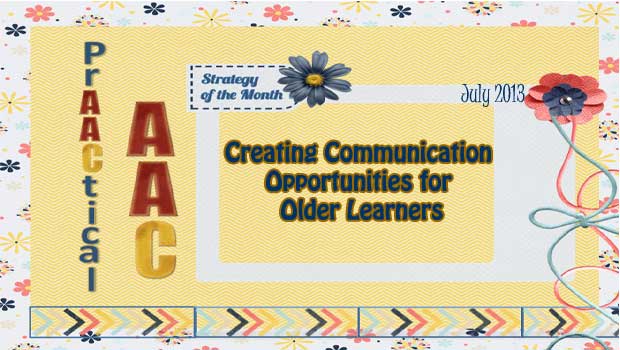
The Strategy of the Month involves AAC and the ‘older learner’. The ‘older learner’ involves a range of ages (We are ‘older learners’ for way longer than we are children) as well as a wide range of functioning levels. Even with this variation though, we know that ALL older learners can learn. There are challenges with ‘older learners’ that need to be addressed in order to facilitate spontaneous and generative communication and language. The challenges may result from years and years of going to intervention (some of it effective, some not), from perceived failure by the learner and/or the professionals, or may even just be related to that ‘teenager or adult’ independent streak. These challenges can definitely be overcome in order to help develop a functional and robust communication system for ALL learners. Just remember respect the learner as a competent teenager or adult (e.g., think what a typical language... [Read More...]
July 6, 2013
by Carole Zangari -
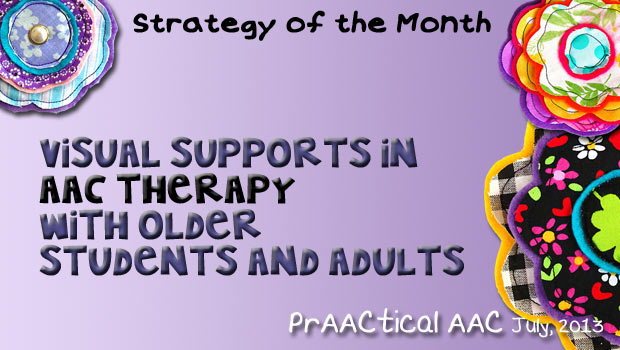
When learners are still struggling with communication in their teenage years and beyond, it means we have a lot of catching up to do. There are lots of implications for us as SLPs, of course, but the main one is this: Every interaction should have a purpose. As we head to the waiting room or classroom to see this student, we’re focused on how we can elicit practice on meaningful skills in the next few minutes. On a good day, we can use these few minutes before the session productively. Before we get to the therapy room we try to: use expectant pauses and graduated prompting to elicit a greeting at his/her highest level engage him/her in conversation to practice social exchanges provide opportunities for him/her to respond to a non-obligatory communicative context and facilitate a response make basic requests, like asking for help to open the door that we’ve... [Read More...]
July 5, 2013
by Robin Parker -

Strategy of the Month AAC Assessment for People with Aphasia Communication Books & Aphasia Speech Supplementation Strategies Aphasia, Supported Communication, Written Choice Strategy, + Variations Making it Work: 6 AAC Strategies for People with Aphasia PrAACtical Thinking Be Chatty: 5 Tips for Supported Conversation 5 PrAACtical Thoughts on Catch-Up Conversations 31 Posts You May Have Missed in May Where to Get PrAACtical Research Reviews Supporting the Use of AAC Listen to Me About What I Need and Want It’s PrAACtically Fathers Day PrAACtical Summer Learning 5 Questions about Aphasia & Communication Books Safety Matters: 5 Resources for People Who Use AAC Weighing The Evidence PrAACtical Evidence on Presuming Competence Helping People with Aphasia Compensate for Their Language Difficulties with Dr. Kristy Weissling PrAACtical Summer Activities AACtual Therapy/ How I Do It Go Fish with AAC and Shareka Bentham Marlene Cummings Shares and Implementation Toolbox Use your Best Spud to Teach Vocabulary... [Read More...]
June 26, 2013
by Carole Zangari -
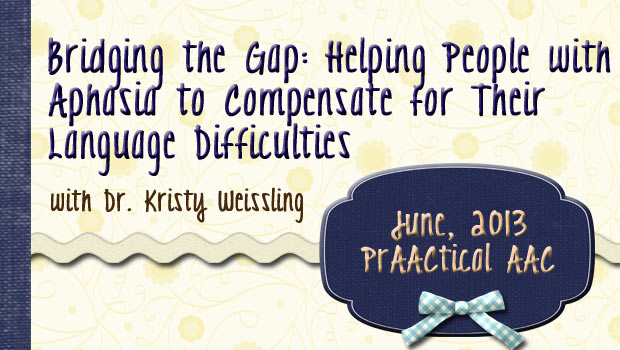
We’re wrapping up Aphasia Month with another fine post from Dr. Kristy Weissling. You can see her earlier posts here and here. In this post, Kristy shares her thoughts on how SLPs can use AAC supports to help individuals with aphasia compensate for their language difficulties. In 2010, my colleague, Carrie Prentice, and I talked about the role of both remediation and compensation in the speech rehabilitation programs of people with aphasia. At that time, we were trying to emphasize that at any particular time in the rehabilitation process, from acute care to outpatient rehabilitation, all possible alternatives should be balanced to create an individualized treatment program. Both restorative and compensatory mechanisms are available to therapist throughout this process. We proposed the work of Dixon, Garrett, and Backman (2008) to formulate a framework for discussing compensation. Six mechanisms of compensation were identified in their chapter on principles of compensation in... [Read More...]
June 22, 2013
by Robin Parker -
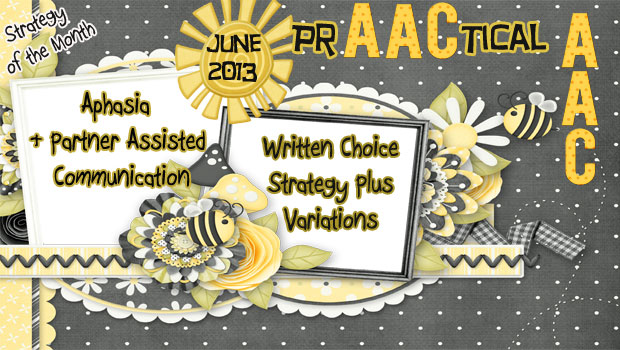
This month, we have enjoyed writing about communication strategies for aphasia. Partner supported communication is the platform for many of the effective techniques we use to help people with aphasia initiate, maintain, or terminate communication and conversation. We have talked about assessment strategies, communication books, and alphabet & topic supplementation. Now it is time to discuss the written choice strategy. The written choice strategy is fairly easy to implement, can look natural, and can result in seamless detailed conversation. Written choices are provided in the context of conversation and are displayed in an organized manner. What is It? The written choice strategy has the partner/facilitator generating written key-word choices that relate to the conversational topic. The written choices can be paired with text, pictures, drawings, symbols, and natural speech. The partner/facilitator writes possible answers to conversational questions in list form. The conversation is extended as continued written choices are offered... [Read More...]
June 8, 2013
by Robin Parker -
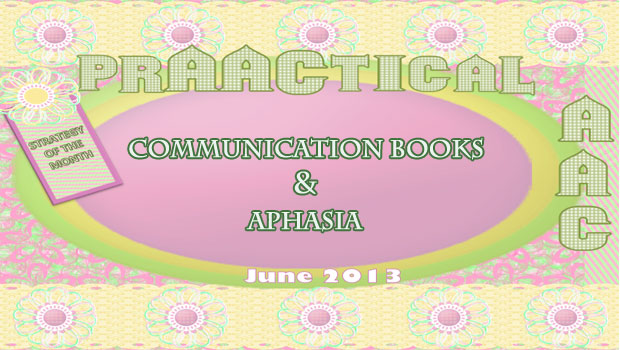
We know aphasia intervention has moved well beyond traditional speech and language training and intervention. We are so happy it has moved to an authentic participation, functional communication, and social interaction focus. Communication books are one tool for helping people with aphasia be active participants in conversation and comprehensive communication. Here are some thoughts and ideas about communication books to get started. Communication Books- Communication books for adults with aphasia can be in grid format with relevant communication messages. There can be a few pages or many, but keep in mind that the more pages, the longer it will take to navigate. It is most important to include high priority and relevant messages that will support needed communication and not just ‘standard’ messages. There are many samples and templates that can be purchased or downloaded for adult communication books. These may be good as a start, but should be individualized when... [Read More...]
June 5, 2013
by Robin Parker -

Strategy of The Month Communication Boards: Colorful Considerations Communication Boards Can Be Used For…. A Lot I Made A Communication Board: Bow What Join Together: Core & Fringe Vocabulary Fresh Look AAC in the Classroom with Joan Bruno Friendship Skills for Children Who Use AAC with Dr. Erinn Finke Top 5 Switches for People With ALS by Amy Roman AAC & Dementia with Dr. Melanie Fried Oken AAC for Children Who Have Rett Syndrome with Dr. Theresa Bartolotta AACtual TherapyHow We Do It Essential Tricks for Supporting AAC in Schools, Part 2 PrAACtical Look: AAC at Dynamic Therapy Associates by Vicki Clarke A Framework for Success Getting Started in the Exciting World of Communication & AAC with Marlene Cummings AAC Myth Buster Wrap-Up PrAActical Thinking It’s PrAACtically Better Hearing & Speech Month 30 Posts You May Have Missed for Autism Awareness Month It’s PrAACtically Mother’s Day- 5 Activities that Support... [Read More...]
June 4, 2013
by Carole Zangari -
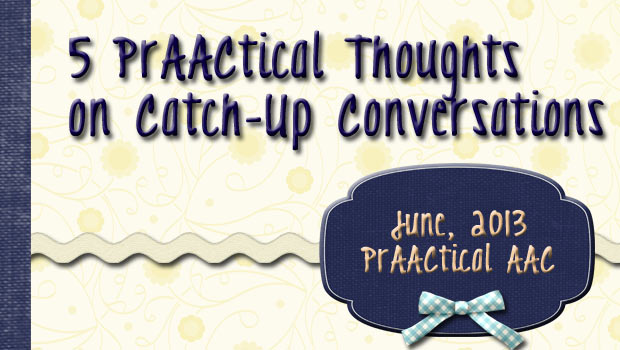
One of the things SLPs frequently do at the start of their therapy sessions is have some casual conversations with their clients to catch up on what happened since their last visit. Whether it is an elementary school student with ASD, a teenager with cerebral palsy, or an older adult with aphasia, we engage in polite conversation to find out what they’ve been up to and perhaps share a bit about our own experiences. Here are some thoughts on making those ‘catch-up conversations’ work from a prAACtical perspective. 1. Possible goal areas: initiate conversation; maintain dialogue on an established topic; redirect conversation to a new topic; respond to non-obligatory communication opportunities; use temporal terms in multi-word utterances; convey a personal narrative with a clear beginning, middle, and end; use regular past tense verbs; ask partner-focused questions 2. Core language targets: it, we, they, do/did, have/had, was/were, not It was (not);... [Read More...]
June 3, 2013
by Robin Parker -
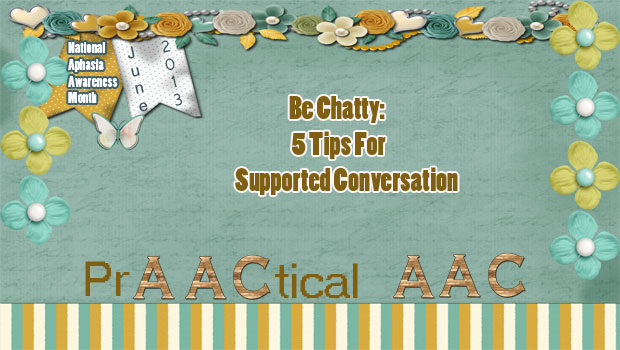
There are many strategies to support communication and conversation for individuals with significant aphasia. Conversation is about connecting with people. We engage in conversation about interesting and relevant experiences to help with connecting. To best connect and be part of conversation, there needs to be comprehension and expression from each communication partner. With aphasia, there is difficulty in these language areas, but it is not that language is lost, it is that it needs to be accessed differently. These quick start tips will support accessing conversation and connections. Write or Draw Key Words– When you are talking, write key words to support your spoken language. Gesture Key Words– When you are talking, supplement spoken language with gestures to illustrate a main point Show Related Photographs or Remnants– While you are talking, use photographs or some remnant of the an experience or event you are talking about. Written Choices to... [Read More...]
May 23, 2013
by Carole Zangari -
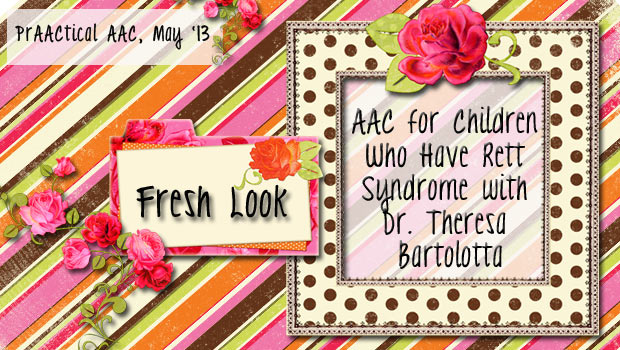
In our SLP training programs, few of us learned about Rett Syndrome or how to provide services to children with that disorder. We’re so pleased to have a guest post on AAC services for children with Rett by Dr. Theresa Bartolotta, Director of Assessment in the Office of the Provost, and Associate Professor in the Department of Speech-Language Pathology, at Seton Hall University, in South Orange, New Jersey. An SLP with over 30 years of clinical experience, she specializes in communication disorders in children with significant disabilities with a special interest in autism and Rett syndrome. Our field is still learning about Rett syndrome and we are still discovering new things about the range of skills and abilities present in the children who have it. In this post, Dr. Bartolotta gives us some background about the syndrome and discusses implications for treatment. I am thrilled to have this opportunity to post... [Read More...]









